A 25-year-old got in a taxi outside an N.Y.C. gay bar. He was dead an hour later.
Social worker Julio Ramirez, 25, met up with a friend on April 20 for a night out in Hell’s Kitchen, a Manhattan neighborhood near Times Square in New York known for its lively restaurant and bar scene. Their last stop was the Ritz Bar and Lounge, a popular, multilevel gay venue in the heart of the neighborhood’s Restaurant Row.
Surveillance footage from a nearby security camera shows Ramirez walking away from the venue with three unidentified men at 3:17 a.m., according to his brother, Carlos, who said he was briefed by investigators. The four men then entered a nearby taxi, a police source said, but Ramirez was alone in the backseat at 4:10 a.m. when the taxi driver approached a police officer 3 miles away in Manhattan’s Lower East Side neighborhood to say his passenger was unresponsive.
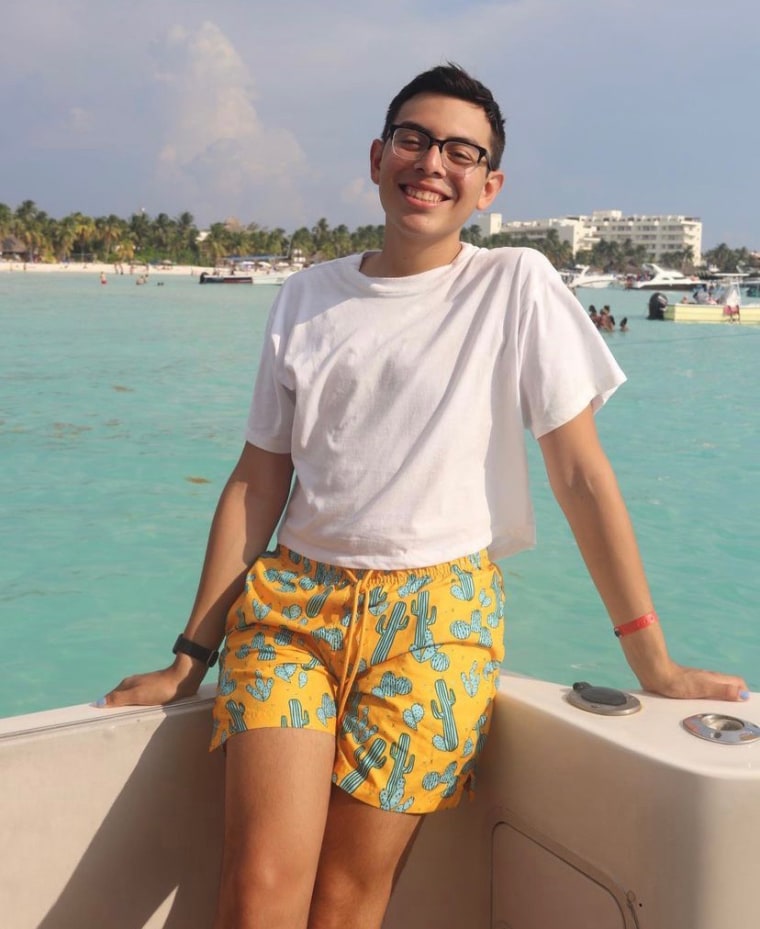
Despite efforts to save his life by the officer and the Emergency Medical Services team, Ramirez was pronounced dead at a nearby hospital at 4:49 a.m. on April 21, a police source said, adding that the initial cause of death was listed as a “possible drug overdose.” Ramirez’s official “cause and manner of death are pending further study,” according to the medical examiner, who told NBC News in an email that this could take “at least a few weeks.” Ramirez was initially identified as “John Doe,” his brother said, because neither his wallet nor phone were with him when he died.
Now, more than a month later, Ramirez’s family and friends are left with more questions than answers as they try to piece together what happened in his final hours. Who were the men who entered the taxi with him? Was he drugged? Are investigators prioritizing his case? Where are his phone and wallet? Who drained his bank accounts in the days following his death?
A night out in Hell’s Kitchen
Ramirez’s friends described him as a “sweet” and “smart” young man, and, according to his brother, Ramirez “believed in serving underprivileged communities.” Originally from Long Island, New York, he had just moved to New York City last year after obtaining a bachelor’s degree and two master’s degrees from the University at Buffalo. He had been living and working in Brooklyn’s Bushwick neighborhood, where he was a bilingual mental health counselor.
Like many gay men in New York City, he was a frequent visitor to Hell’s Kitchen, which, along with its southern neighbor, Chelsea, reportedly has the highest concentration of LGBTQ bars and resources in the city — and perhaps the world.
On what would be his final night out in Hell’s Kitchen, Ramirez met up with his friend Carlos Camacho, a 24-year-old aspiring actor who lives in the neighborhood. Camacho said he and Ramirez met on April 20 at 7 p.m. and visited three venues all within a half-mile of each other: Rise Bar, a gay cocktail lounge; Mickey Spillane’s, a bar and restaurant; and, finally, Ritz Bar and Lounge.
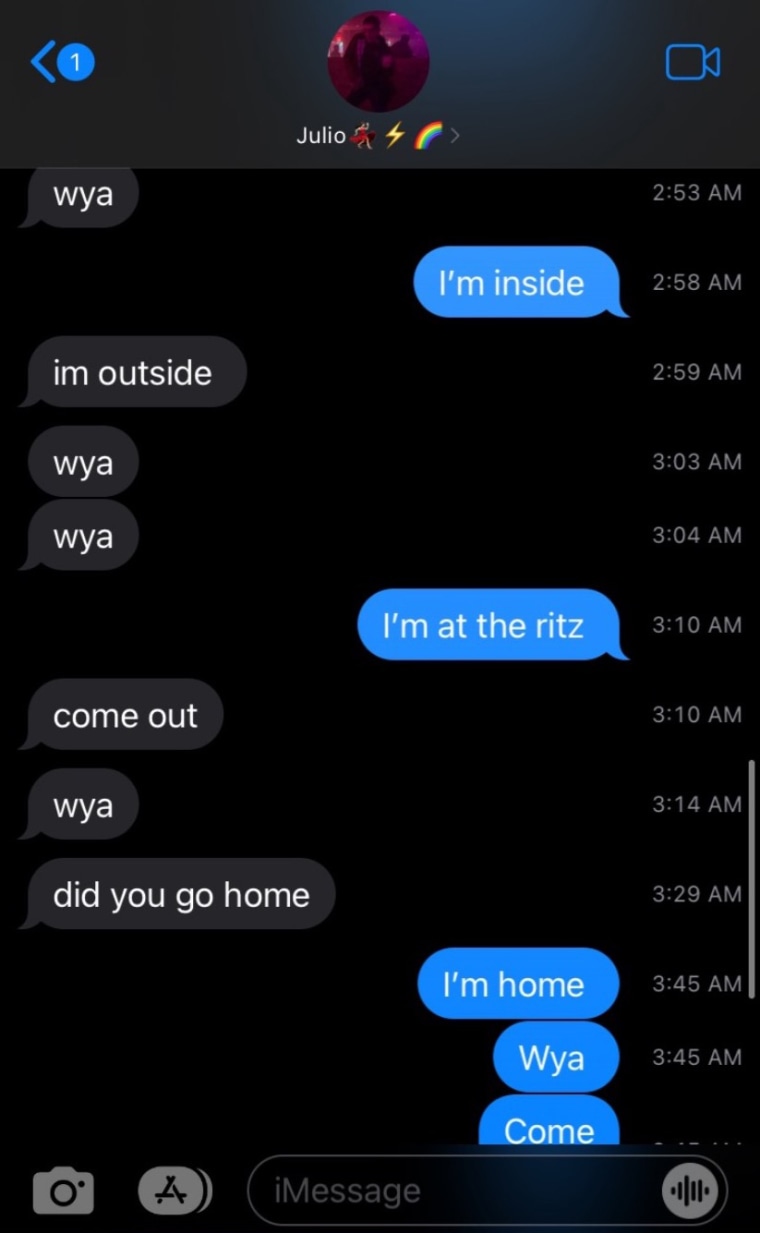
The two friends, who have known each other since June, got separated just before 3 a.m., according to their last text exchange, which Camacho shared with NBC News.
At 2:58 a.m., Camacho told Ramirez he was inside the Ritz, and a minute later, Ramirez responded saying he was outside the bar, according to the texts. At 3:10 a.m., Ramirez told his friend to come outside. After not receiving a response, Ramirez texted Camacho, who lives nearby, at 3:29 a.m. to ask if he went home. Camacho responded at 3:45 a.m. to confirm that he was home and asked his friend to come over. Ramirez never responded.
At 12:10 p.m. on April 21, Camacho sent a follow-up message to Ramirez asking him “what happened” the night before. An alert popped up notifying Camacho that his message to Ramirez had been “read,” though unbeknownst to Camacho at the time, his friend had been pronounced dead more than seven hours earlier.
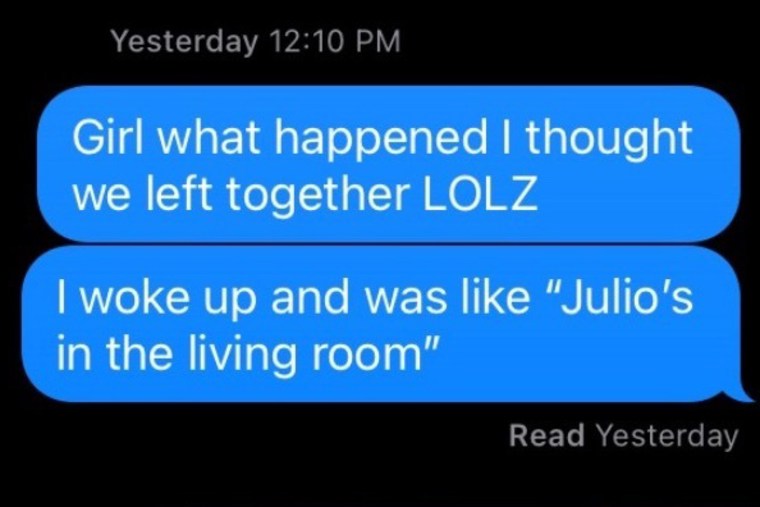
‘I knew something was up’
Earlier that evening, Ramirez had been texting with Shiva Campbell, a friend from Buffalo with whom he was in “constant contact,” according to Campbell. They were chatting about saving money and Adam Sandler movies before Ramirez stopped responding at 10:25 p.m. on April 20, according to their final text exchange, which Campbell shared with NBC News.
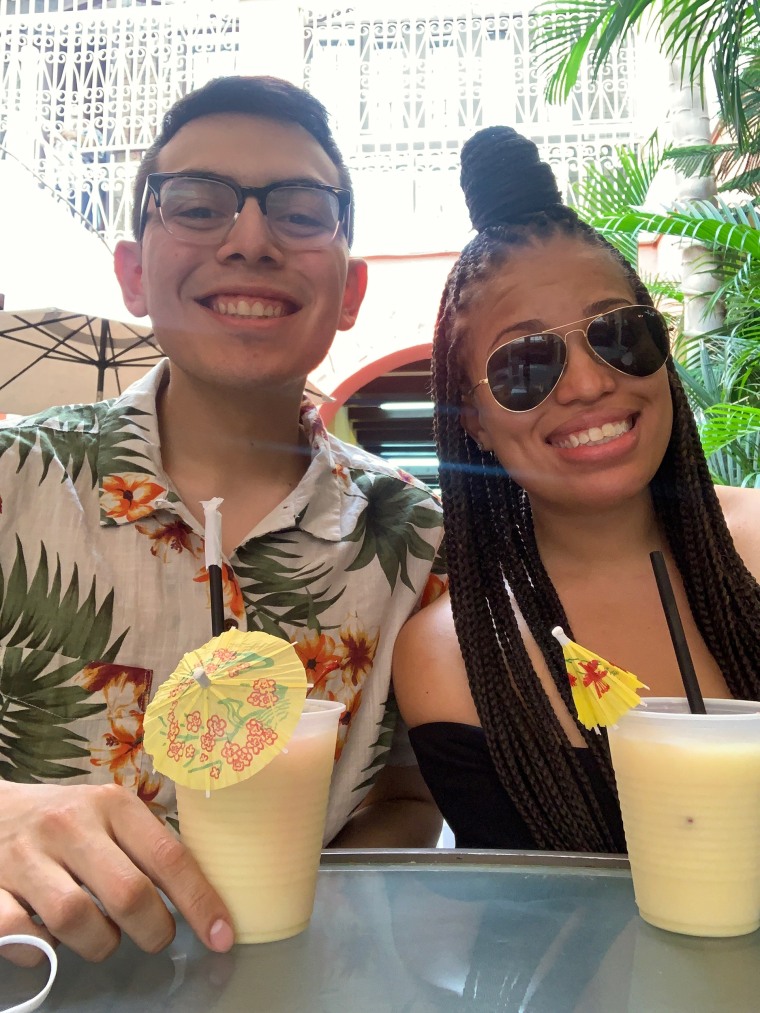
Campbell said she and Ramirez had remained close after meeting as college freshmen, and, like many young friends, they used the location sharing feature on their iPhones. They had done so for the past several years, so Campbell said she became concerned when at 3:46 a.m. on April 21 an alert popped up saying, “Julio Ramirez stopped sharing location with you.”
She continued to text Ramirez throughout the day on April 21 asking where he was and whether he was OK. Her concern turned to alarm when she noticed the color of the text messages she sent him turned from blue to green, which can indicate his phone had been turned off or had died.
“Julio never lets his phone die,” she said. “Even if he lost his phone, he would text me on his iPad, so I knew something was up.”
Campbell’s last text to Ramirez was on April 22 at 8:06 a.m.: “Ramirez, did something happen?” She would soon discover that he had been pronounced dead more than 24 hours earlier.
Get the Morning Rundown
Get a head start on the morning’s top stories.SIGN UPTHIS SITE IS PROTECTED BY RECAPTCHA PRIVACY POLICY | TERMS OF SERVICE
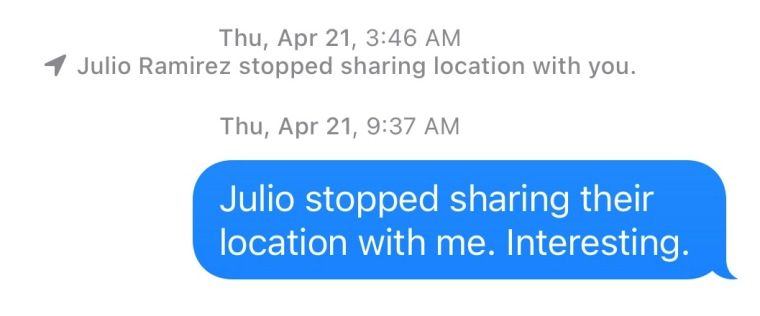
Theories and speculation
Carlos Ramirez, 32, said he called his younger brother in the afternoon on April 21 and found it strange that his phone appeared to be turned off. He had planned to call him later that evening but fell asleep before he had the chance, he said.
While he was at work on April 22, Carlos Ramirez received a call from his girlfriend around 11 a.m. telling him to immediately leave work and call his father. When he called, he discovered his parents had received a dreaded phone call 20 minutes earlier from Mount Sinai Beth Israel hospital in Manhattan informing them that their son Julio had died the prior morning.
“My dad said, ‘This is really hard, but Julio is dead,’ and he just started crying,” he recalled. “I just lost it. Wow, I couldn’t believe it yet. That was just the worst day of my life.”
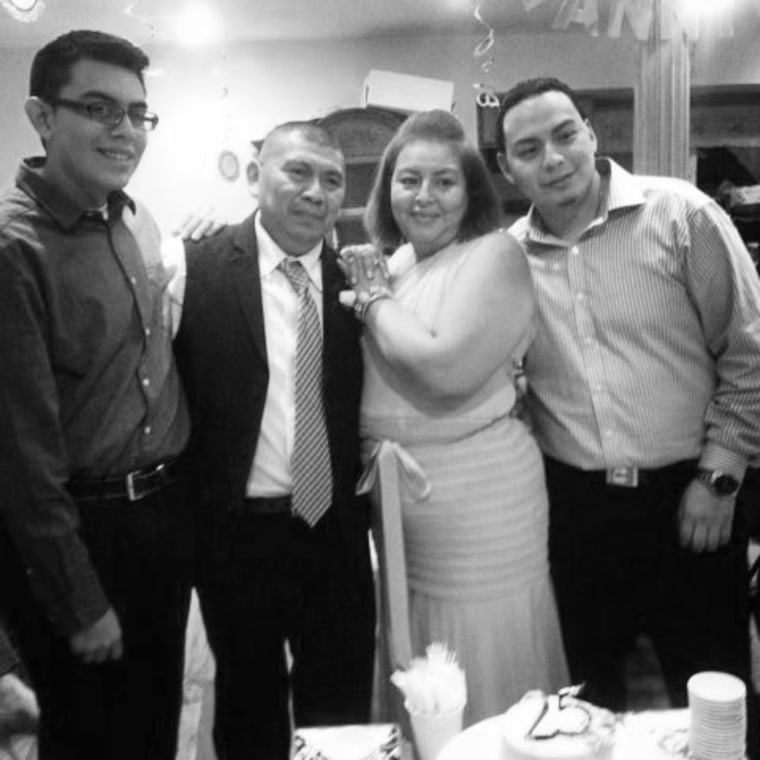
Three days later, the Ramirez family went to Julio Ramirez’s apartment to collect some of his personal belongings. Eager for answers, Carlos Ramirez logged on to his brother’s laptop. He immediately noticed the Apple iCloud password had been changed, leaving him unable to access most of the applications on his brother’s computer. He was, however, able to access Julio Ramirez’s emails. He said that’s when he noticed unusual money transfers.
Recommended

OUT NEWSUkraine’s ‘unicorn’ LGBTQ soldiers head for war

OUT POLITICS AND POLICYShe’s America’s first openly lesbian speaker. Now she’s running to be the first lesbian governor.
Between April 21, the day Julio Ramirez died, and April 25, his checking and savings accounts were depleted through purchases and third-party applications like Apple Pay and Zelle, Carlos Ramirez said.
“They had literally taken every dollar that he had, all his savings and all of his money,” Carlos Ramirez said, adding that approximately $20,000 was taken from his brother. He said he shared this information with investigators, though the NYPD would not confirm this detail to NBC News.
Given these details, and the information investigators shared with him based on surveillance footage, Carlos Ramirez said he believes his brother may have been drugged and robbed that night in a targeted attack.
Carlos Ramirez — who did not see the footage himself — said investigators told him the video shows his brother standing outside of the Ritz Bar and Lounge entrance by himself for 12 minutes shortly after 3 a.m. He is then seen walking away from the bar with two men, and as they turn the corner, a third man follows behind them.
“All three men end up in a cab with Julio,” Carlos Ramirez said investigators told him. He said the men have not been identified.
Based on the limited information they’ve pieced together, Carlos Ramirez and at least one of his brother’s friends, Karinina Quimpo, speculated that Julio Ramirez may have been slipped gamma-hydroxybutyric acid, or GHB, also known as the “date rape drug.” In liquid form, it is clear and colorless, and just a small amount can bring someone to unconsciousness; overdoses can lead to coma, respiratory arrest and even cause death. In recent years, health officials have seen a rise in GHB use among young Americans. Neither the police nor the medical examiner has indicated Julio Ramirez ingested GHB prior to his death.
‘Justice for Julio’
Julio Ramirez was buried at Pinelawn Cemetery in Farmingdale, New York, on April 30. Two weeks later, on May 14, his family and friends held a memorial service in Buffalo.
In the weeks following his mysterious death, his loved ones have been trying to raise awareness about his story as they wait for additional information from the NYPD and the city’s medical examiner.
In an Instagram post May 9, Quimpo shared some of the details surrounding his death and said his “story needs to be solved and heard.” She pleaded for “justice for Julio.”
“We urge you to raise awareness on the death of Julio Cesar Ramirez, to give a voice to gay Latino men who are victims of the crime in this city and to seek justice for the loved ones he left behind,” she wrote. “Julio’s story needs to be heard.”